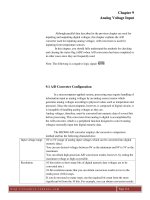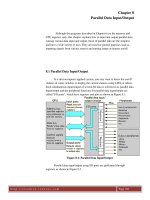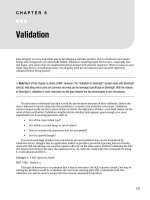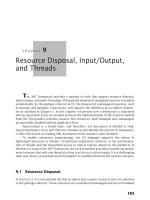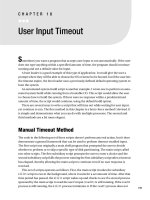Input Validation
Bạn đang xem bản rút gọn của tài liệu. Xem và tải ngay bản đầy đủ của tài liệu tại đây (488.25 KB, 31 trang )
P
ractically all software applications depend on some form of user input to create out-
put. This is especially true for web applications, where just about all output depends on
what the user provides as input.
First and foremost, you must realize and accept that any user-supplied data is inherently
unreliable and cannot be trusted. By the time input reaches PHP, it’s passed through the user’s
browser, any number of proxy servers and firewalls, filtering tools on your server, and possibly
other processing modules. Any one of those “hops” have an opportunity—be it intentional or
accidental—to corrupt or alter the data in some unexpected manner. And because the data ul-
timately originates from a user, the input could be coerced or tailored out of curiosity or malice
to explore or push the limits of your application. It is absolutely imperative to validate all user
input to ensure it matches the expected form.
There’s no “silver bullet” that validates all input, no universal solution. In fact, an attempt to
devise a broad solution tends to cause as many problems as it solves—as PHP’s “magic quotes”
will soon demonstrate. In a well-written, secure application, each input has its own validation
1
Input Validation
22
Input Validation
routine, specifically tailored to the expected data and the ways it’s used. For example, integers
can be verified via a fairly simple casting operation, while strings require a much more verbose
approach to account for all possible valid values and how the input is utilized.
This chapter focuses on three things:
• How to identify input methods. (Understanding how external data makes its way into
a script is essential.)
• How each input method can be exploited by an attacker.
• How each form of input can be validated to prevent security problems.
The Trouble with Input
Originally, PHP programmers accessed user-supplied data via the “register globals” mecha-
nism. Using register globals, any parameter passed to a script is made available as a variable
with the same name as the parameter. For example, the URL
script.php?foo=bar
creates a
variable
$foo
with a value of
bar
.
While register globals is a simple and logical approach to capturing script parameters, it’s
vulnerable to a slew of problems and exploits.
One problem is the conflict between incoming parameters. Data supplied to the script can
come from several sources, including
GET
,
POST
, cookies, server environment variables, and
system environment variables, none of which are exclusive. Hence, if the same parameter is
supplied by more than one of those sources, PHP is forced to merge the data, losing informa-
tion in the process. For example, if an
id
parameter is simultaneously provided in a
POST
re-
quest and a cookie, one of the values is chosen in favor of the other. This selection process is
called a merge.
Two
php.ini
directives control the result of the merge: the older
gpc_order
and the newer
variables_order
. Both settings reflect the relative priority of each input source. The default or-
der for
gpc_order
is
GPC
(for
GET
,
POST
, cookie, respectively), where cookie has the highest prior-
ity; the default order for
variables_order
is
EGPCS
(system Environment,
GET
,
POST
, cookie, and
Server environment, respectively). According to both defaults, if parameter
id
is supplied via
a
GET
and a cookie, the cookie’s value for
id
is preferred. Perhaps oddly, the data merge occurs
outside the milieu of the script itself, which has no indication that any data was lost.
A solution to this problem is to give each parameter a distinct prefix that reflects its origin.
For example, parameters sent via
POST
would have a
p_
prefix. But this technique is only reliable
in a controlled environment where all applications follow the convention. For distributable ap-
23Input Validation
plications that work in a multitude of environments, this solution is by no means reliable.
A more reliable but cumbersome solution uses
$HTTP_GET_VARS
,
$HTTP_POST_VARS
, and
$HTTP_COOKIE_VARS
to retain the data for
GET
,
POST
, and cookie, respectively. For example, the
expression
$HTTP_GET_VARS[‘id’]
references the
id
parameter associated with the
GET
portion
of the request.
However, while this approach doesn’t lose data and makes it very clear where data is
coming from, the
$HTTP_*_VARS
variables aren’t global and using them from within func-
tions and methods makes for very tedious code. For instance, to import
$HTTP_GET_VARS
into the scope of a method or function, you must use the special
$GLOBALS
variable, as in
$GLOBALS[‘HTTP_GET_VARS’]
, and to access the value of id, you must write the longwinded
$GLOBALS[‘HTTP_GET_VARS’][‘id’]
.
In comparison, the variable
$id
can be imported into the function via the much simpler
(but error-prone)
$GLOBALS[‘id’]
. It’s hardly surprising that many developers chose the path
of least resistance and used the simpler, but much less secure register global variables. Indeed,
the vulnerability of register globals ultimately led to the option being disabled by default.
For a perspective, consider the following code:
if (is_authorized_user()) {
$auth = TRUE;
}
if ($auth) {
/* display content intended only for authorized users */
}
When enabled, register globals creates variables to represent user input that are otherwise in-
distinguishable from other script variables. So, if a script variable is left uninitialized, an en-
terprising user can inject an arbitrary value into that variable by simply passing it via an input
method.
In the instance above, the function
is_authorized_user()
determines if the current user
has elevated privileges and assigns
TRUE
to
$auth
if that’s the case. Otherwise,
$auth
is left un-
initialized. By providing an
auth
parameter via any input method, the user can gain access to
privileged content.
The issue is further compounded by the fact that, unlike other programming languages,
uninitialized variables inside PHP are notoriously difficult to detect. There is no “strict” mode
(as found in Perl) or compiler warnings (as found in C/C++) that immediately highlight ques-
24
Input Validation
tionable usage. The only way to spot uninitialized variables in PHP is to elevate the error re-
porting level to
E_ALL
. But even then, a red flag is raised only if the script tries to use an unini-
tialized variable.
In a scripting language such as PHP, where the script is interpreted each execution, it is in-
efficient for the compiler to analyze the code for uninitialized variables, so it’s simply not done.
However, the executor is aware of uninitialized variables and raises notices (
E_NOTICE
) if your
error reporting level is set to
E_ALL
.
# Inside PHP configuration
error_reporting=E_ALL
# Inside httpd.conf or .htacces for Apache
# numeric values must be used
php_value error_reporting 2047
# You can even change the error
# reporting level inside the script itself
error_reporting(E_ALL);
While raising the reporting level eventually detects most uninitialized variables, it doesn’t de-
tect all of them. For example, PHP happily appends values to a nonexistent array, automatically
creating the array if it doesn’t exist. This operation is quite common and unfortunately isn’t
flagged. Nonetheless, it is very dangerous, as demonstrated in this code:
# Assuming script.php?del_user[]=1&del_user[]=2 & register_globals=On
$del_user[] = “95”; // add the only desired value
foreach ($del_user as $v) {
mysql_query(“
DELETE FROM users WHERE id=”.(int)$v);
}
Above, the list of users to be removed is stored inside the
$del_user
array, which is supposed
to be created and initialized by the script. However, since register globals is enabled,
$del_user
is already initialized through user input and contains two arbitrary values. The value
95
is ap-
pended as a third element. The consequence? One user is intentionally removed and two users
are maliciously removed.
25Input Validation
There are only two ways to prevent this problem. The first and arguably best one is to al-
ways initialize your arrays, which requires just a single line of code:
// initialize the array
$del_user = array();
$del_user[] = “95”; // add the only desired value
Setting
$del_user
creates a new empty array, erasing any injected values in the process.
The other solution, which may not always be applicable, is to avoid appending values to
arrays inside the global scope of the script where variables based on input may be present.
An Alternative to Register Globals: Superglobals
Comparatively speaking, register globals are probably the most common cause of security vul-
nerabilities in PHP applications.
It should hardly be surprising then that the developers of PHP deprecated register glo-
bals in favor of a better input access mechanism. PHP 4.1 introduced the so-called superglobal
variables
$_GET
,
$_POST
,
$_COOKIE
,
$_SERVER,
and
$_ENV
to provide global, dedicated access to
individual input methods from anywhere inside the script. Superglobals increase clarity, iden-
tify the input source, and eliminate the aforementioned merging problem. Given the success-
ful adoption of superglobals after the release of PHP 4.1, PHP 4.2 disabled register globals by
default.
Alas, getting rid of register globals wasn’t as simple as that. While new installations of PHP
have register globals disabled, upgraded installations retain the setting in
php.ini
. Further-
more, many hosting providers intentionally enable register globals, because their users depend
on legacy or poorly-written PHP applications that rely on register globals for input processing.
Even though register globals was deprecated years ago, most servers still have it enabled and all
applications need to be designed with this in mind.
The Constant Solution
The use of constants provides very basic protection against register globals. Constants have
to be created explicitly via the
define()
function and aren’t affected by register globals (unless
the name parameter to the define function is based on a variable that could be injected by the
user). Here, the constant
auth
reflects the results of
is_authorized_user()
:
26
Input Validation
define(‘auth’, is_authorized_user());
if (auth) {
/* display content intended only for authorized users */
}
Aside from the added security, constants are also available from all scopes and cannot be mod-
ified. Once a constant has been set, it remains defined until the end of the request. Constants
can also be made case-insensitive by passing
define()
a third, optional parameter, the value
TRUE
, which avoids accidental access to a different datum caused by case variance.
That said, constants have one problematic feature that stems from PHP’s lack of strictness:
if you try to access an undefined constant, its value is a string containing the constant name
instead of
NULL
(the value of all undefined variables). As a result, conditional expressions that
test an undefined constant always succeed, which makes it a somewhat dangerous solution,
especially if the constants are defined inside conditional expressions themselves. For example,
consider what happens here if the current user is not authorized:
if (is_authorized_user())
define(‘auth’, TRUE);
if (auth) // will always be true, either Boolean(TRUE) or String(“auth”)
/* display content intended only for authorized users */
Another approach to the same problem is to use type-sensitive comparison. All PHP input data
is represented either as a string or an array of strings if [] is used in the parameter name. Type-
sensitive comparisons always fail when comparing incompatible types such as string and
Booleans.
if (is_authorized_user())
$auth = TRUE;
if ($auth === TRUE)
/* display content intended only for authorized users */
Type-sensitive comparisons validate your data. And for the performance-minded developer,
type-sensitive comparisons also slightly improve the performance of your application by a few
27Input Validation
precious microseconds, which after a few hundreds of thousands operations add up to a sec-
ond.
The best way to prevent register globals from becoming a problem is to disable the option.
However, because input processing is done prior to the script execution, you cannot simply
use
ini_set()
to turn them off. You must disable the option in
php.ini
,
httpd.conf
, or
.htac-
cess.
The latter can be included in distributable applications, so that your program can benefit
from a more secure environment even on servers controlled by someone else. That said, not
everyone runs Apache and not all instances of Apache allow the use of
.htaccess
to specify
configuration directives, so strive to write code that is register globals-safe.
The $_REQUEST Trojan Horse
When superglobals were added to PHP, a special superglobal was added specifically to simplify
the transition from older code. The
$_REQUEST
superglobal combines the values from
GET
,
POST
,
and cookies into a single array for ease of use. But as PHP often demonstrates, the road to hell
is paved with good intentions. While the
$_REQUEST
superglobal can be convenient, it suffers
from the same loss of data problem caused when the same parameter is provided by multiple
input sources.
To use
$_REQUEST
safely, you must implement checks through other superglobals to use
the proper input source. Here, an
id
parameter provided by a cookie instead of
GET
or
POST
is
removed.
# safe use of _REQUEST where only GET/POST are valid
if (!empty($_REQUEST[‘id’]) && isset($_COOKIE[‘id’]))
unset(
$_REQUEST[‘id’]);
But validating all of the input in a request is tedious, and negates the convenience of
$_REQUEST
. It’s much simpler to just use the input method-specific superglobals instead:
if (!empty($_GET[‘id’]))
$id =
$_GET[‘id’];
else if (!empty($_POST[‘id’]))
$id =
$_POST[‘id’];
else
$id = NULL;
28
Input Validation
Validating Input
Now that you’ve updated your code to access input data in a safer manner, you can proceed
with the actual guts of the application, right?
Wrong!
Just accessing the data in safe manner is hardly enough. If you don’t validate the content of
the input, you’re just as vulnerable as you were before.
All input is provided as strings, but validation differs depending on how the data is to be
used. For instance, you might expect one parameter to contain numeric values and another to
adhere to a certain pattern.
Validating Numeric Data
If a parameter is supposed to be numeric, validating it is exceptionally simple: simply cast the
parameter to the desired numeric type.
$_GET[‘product_id’] = (int) $_GET[‘product_id’];
$_GET[‘price’] = (float) $_GET[‘price’];
A cast forces PHP to convert the parameter from a string to a numeric value, ensuring that the
input is a valid number.
In the event a datum contains only non-numeric characters, the result of the conversion
is 0. On the other hand, if the datum is entirely numeric or begins with a number, the numeric
portion of the string is converted to yield a value. In nearly all cases the value of 0 is undesirable
and a simple conditional expression such as
if (!$value) {error handling}
based on type
cast variable will be sufficient to validate the input.
When casting, be sure to select the desired type, since casting a floating-point number to
an integer loses significant digits after the decimal point. You should always cast to a floating-
point number if the potential value of the parameter exceeds the maximum integer value of the
system. The maximum value that can be contained in a PHP integer depends on the bit-size
of your processor. On 32-bit systems, the largest integer is a mere 2,147,483,647. If the string
“1000000000000000000” is cast to integer, it’ll actually overflow the storage container resulting
in data loss. Casting huge numbers as floats stores them in scientific notation, avoiding the loss
of data.
29Input Validation
echo (int)”100000000000000000”; // 2147483647
echo (float)”100000000000000000”; // float(1.0E+17)
While casting works well for integers and floating-point numbers, it does not handle hexa-
decimal numbers (
0xFF
), octal numbers (
0755
) and scientific notation (
1e10
). If these number
formats are acceptable input, an alternate validation mechanism is required.
The slower but more flexible
is_numeric()
function supports all types of number formats.
It returns a Boolean
TRUE
if the value resembles a number or
FALSE
otherwise. For hexadecimal
numbers, “digits” other than
[0-9A-Fa-f]
are invalid. However, octal numbers can (perhaps
incorrectly) contain any digit
[0-9]
.
is_numeric(“0xFF”); // true
is_numeric(“0755”); // true
is_numeric(“1e10”); // true
is_numeric(“0xGG”); // false
is_numeric(“0955”); // true
Locale Troubles
Although floating-point numbers are represented in many ways around the world, both cast-
ing and
is_numeric()
consider floating-point numbers that do not use a period as the decimal
point as invalid. For example, if you cast
1,23
as a
float
you get
1
; if you ask
is_numeric(“1,23”)
,
the answer is
FALSE
.
(float)”1,23”; // float(1)
is_numeric(“1,23”); // false
This presents a problem for many European locales, such as French and German, where the
decimal separator is a comma and not a period. But, as far as PHP is concerned, only the period
can be used a decimal point. This is true regardless of locale settings, so changing the locale has
no impact on this behavior.
30
Input Validation
setlocale(LC_ALL, “french”);
echo (float) “9,99”; // 9
is_numeric(“9,99”); // false
Performance Tip
Casting is faster than
is_numeric()
because it requires no function calls. Additionally, casting returns a
numeric value, rather than a “yes” or “no” answer.
Once you’ve validated each numeric input, there’s one more step: you must replace each input
with its validated value. Consider the following example:
# $_GET[‘del’] = “1; /* Muwahaha */ TRUNCATE users;”
if ((int)$_GET[‘del’]) {
mysql_query(“
DELETE FROM users WHERE id=”.$_GET[‘del’]);
}
While the string
$GET[‘del’]
casts successfully to an integer (
1
), using the original data injects
additional SQL into the query, truncating the user table. Oops!
The proper code is shown below:
if (($_GET[‘del’] = (int)$_GET[‘del’])) {
mysql_query(“
DELETE FROM users WHERE id=”.$_GET[‘del’]);
}
# OR
if ((int)$_GET[‘del’]) {
mysql_query(“
DELETE FROM users WHERE id=”.(int)$_GET[‘del’]);
}
Of the two solutions shown above, the former is arguably slightly safer because it renders fur-
ther casts unnecessary—the simpler, the better.
String Validation
While integer validation is relatively straightforward, validating strings is a bit trickier because
a cast simply doesn’t suffice. Validating a string hinges on what the data is supposed to repre-
31Input Validation
sent: a zip code, a phone number, a URL, a login name, and so on.
The simplest and fastest way to validate string data in PHP is via the ctype extension that’s
enabled by default. For example, to validate a login name,
ctype_alpha()
may be used.
ctype_
alpha()
returns
TRUE
if all of the characters found in the string are letters, either uppercase
or lowercase. Or if numbers are allowed in a login name,
ctype_alnum()
permits letters and
numbers.
ctype_alpha(“Ilia”); // true
ctype_alpha(“JohnDoe1”); // false
ctype_alnum(“JohnDoe1”); // true
ctype_alnum()
only accepts digits
0-9
, so floating point numbers do not validate. The letter
testing is interesting as well, because it’s locale-dependent. If a string contains valid letters from
a locale other than the current locale, it’s considered invalid. For example, if the current locale
is set to English and the input string contains French names with high-ASCII characters such
as é, the string is considered invalid. To handle those characters the locale must be changed to
one that supports them:
ctype_alpha(“François”); // false on most systems
setlocale(LC_CTYPE, “french”); // change the current locale to French
ctype_alpha(“François”); // true now it works (assuming setlocale() succeeded)
As shown above, you set the locale via
setlocale()
. The function takes the type of locale to set
and an identifier for the locale. To validate data, specify
LC_CTYPE; a
lternatively, use
LC_ALL
to
change the locale for all locale-sensitive operations. The language identifier is usually the name
of the language itself in lowercase.
Once the locale has been set, content checks can be performed without the fear of special-
ized language characters invalidating the string.
Convenient? Not Really
Some systems, like FreeBSD and Windows, include high-ASCII characters used in most European languag-
es in the base English character set. However you shouldn’t rely on this behavior. On various flavors of
Linux and several other operating systems, you must set the proper locale.
32
Input Validation
Like most fast and simple mechanisms, ctype has a number of limitations, which somewhat
limit its usefulness. Various, perfectly valid characters, such as emdashes (
—
) and single quotes
are not found in the locale-sensitive
[A-Za-z]
range and invalidate strings. White space charac-
ters such as spaces, tabs, and new lines are also considered invalid. Moreover, because ctype is
a separate extension, it may be missing or disabled (although that is a rare situation). Ctype is
also limited to single-byte character sets, so forget about using it to validate Japanese text.
Where ctype fails, regular expressions come to the rescue. Found in the perennial ereg ex-
tension, regular expressions can perform all of tricky validations ctype balks on. You can even
validate multibyte strings if you combine ereg with the mbstring (PHP multibyte strings) exten-
sion. Alas, regular expressions aren’t exceptionally fast and validating large strings of data may
take noticeable amount of time. But, safety must come first.
Here’s an example that determines if a string contains any character other than a letter, a
digit, a tab, a newline, a space, an emdash, or a single quote:
# string validation
ereg(“[^-’A-Za-z0-9 \t]”, “don’t forget about secu-rity”); // Boolean(false)
ereg(pattern, string)
returns
int(1)
if the string matches the pattern.
For this example, a valid string can contain a letter, a digit, a tab, a newline, a space, an
emdash, or a single quote. However, since the goal is validation — looking for characters other
than those valid characters—the selection is reversed with the caret (
^
) operator. In effect, the
pattern
[^-’A-Za-z0-9 \t]
says, “Find any character that isn’t one of the characters in the
specified list.” Thus, if
ereg()
returns
int(1),
the string contains invalid data.
While the regular expression (or regex) shown above works well, it does not include valid
letters in other languages. In instances where the data may contain characters from different
locales, special care must be taken to prevent those characters from triggering invalid input
condition. As with the ctype functions, you must set the appropriate locale and specify the
proper alphabetic character range. But since the latter may be a bit complex,
[[:alnum:]]
pro-
vides a shortcut for all valid, locale-specific alphanumeric characters, and
[[:alpha:]]
pro-
vides a shortcut for just the alphabet.
ereg(“[^-’[[:alpha:]] \t]”, “François») ; // int(1)
